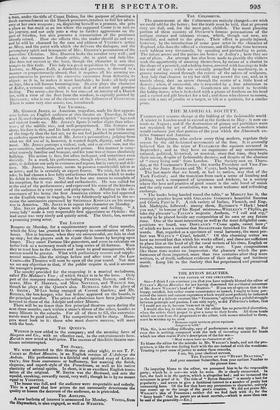THE MADRIGAL SOCIETY.
FASHIONABLE seasons change at the bidding of the fashionable world
A winter in London used to extend at the furthest to May : it now ex- tends to August ; and if the destruction of grouse and partridges were not regulated by act of Parliament, the period of a modern winter would embrace just that portion of the year which the Almanack en- titles Summer and Autumn.
The Madrigalians, who eschew every thing modern, regulate their season by the old.hishioned movements of the Sun. It is generally
believed that in the reign of ELIZABETH the equinox occurred in
September ; and as they have no cognizance of any occurrences, rational, political, historical, or musical, since that time, they begin
their season, despite of fashionable decrees, and despite of the absence of " every living soul" from London. The Society met on Thurs- day, at the Freemason's Tavern ; the worthy President and Vice-Pre- sident, Sir JOHN ROGERS and Mr. CA PEL, both being present.
The last music that 1Ve heard, or had to notice, was that of the York Festival ; and the transition from such a scene of humbug and jobbing, such a compound of ignorance and trickery, to a society where the love and practice of good music is the sole bond of union and the only cause of association, was a most welcome and refreshing exchange.
" The books being handed round the table," as MORLEY has it, the evening's practice began with ORLANDO Grimes's beautiful Sanctus
and Gloria Petri in F. A rich variety of Italian, Flemish, and Eng-
lish Madrigals, followed : among them, BATESON'S " Hark ! heard you not," in honour of his Royal mistress—WeeeitEs's "Phyllis, go-
take thy pleasure"—TALLis's majestic Anthem, "I call and cry," worthy to be placed beside any composition of its own or any future time. One of the most interesting as well as the most delightful com- positions we heard, was DowLAND's "Come again, sweet love ;"
of which we have a surmise that SIIA KSPEA RE furnished his friend the words. But, regarded as a specimen of vocal harmony, the most per- fect was WILB YE'S " Cruel, behold." Of this charming writer we
have no record but that which his works afford; and these are sufficient to place him at the head of all the vocal writers of his time, English or foreign, numerous and excellent as they were. Upon compositions like these time makes no impression : the pleasure which the per- formance of them imparted, more than two centuries after they were written, is, of itself, sufficient evidence of their sterling and intrinsic worth. Long life to the Society that has perpetuated and preserved them !


























 Previous page
Previous page